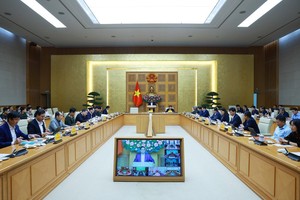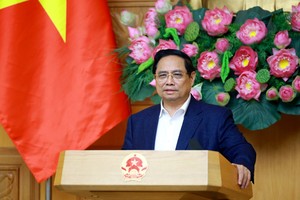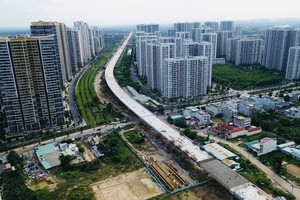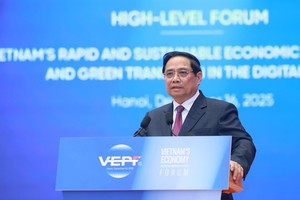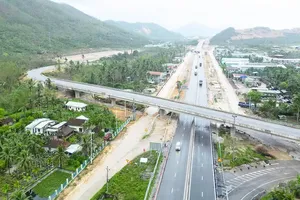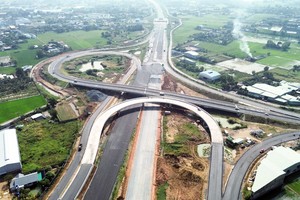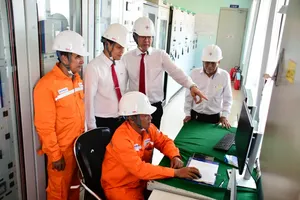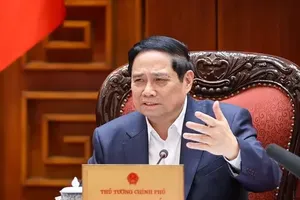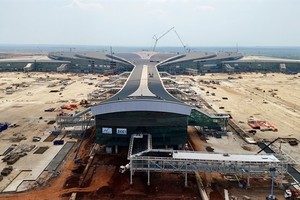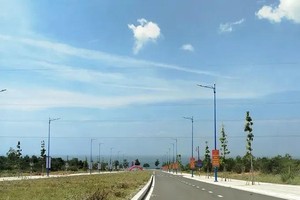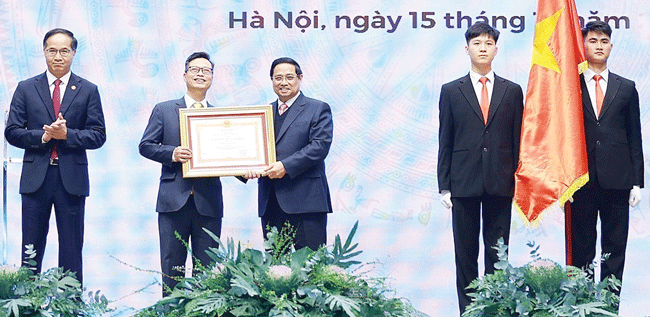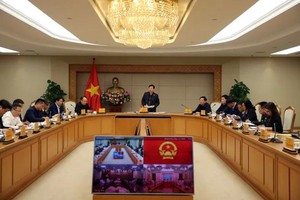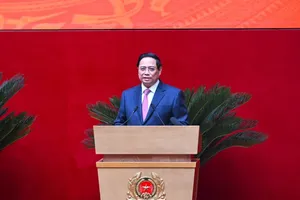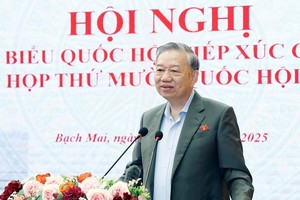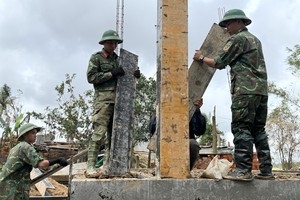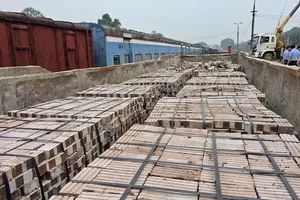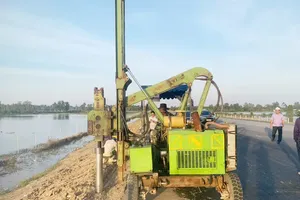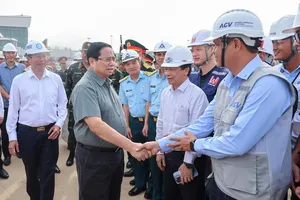Thousands thronged a bank in Ho Chi Minh City Wednesday to transfer money to a real estate company as a “goodwill sum” upon which the firm will draw lots to select who are to fortunate enough buy its highly-sought, super-profitable apartments.
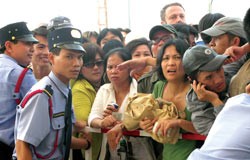
But have they fallen into the company’s traps?
At the Indovina Bank on 39 Ham Nghi Street district 1, there were thousands shoving and jostling against one another to transfer VND200 million to Phu My Hung Corporation which is offering 300 apartments at its Sky Garden II Building to only 1,000 ‘candidates’.
This means 700 will be eliminated in the lot drawing, to take place on November 4 at the Independence Palace.
Though Phu My Hung has announced for sometime that all prospective purchasers must transfer the VND200 million it calls “goodwill sum” to its bank account, the real estate firm has kept the account number secret until that very morning.
In addition, Phu My Hung’s requirements that all money be transferred from Indovina and not other banks are suspicious.
This all understandably has contributed to pushing bank-transaction demands at their peak.
Many posed the question: Is it a ploy to make outsiders think Phu My Hung apartments are being sold like hot cakes?
Why did the firm not announce the account number beforehand so that potential customers can take turns transferring their “goodwill money”, thus preventing massive chaos? And why was only Indovina eligible?
Considering Indovina has one branch located inside Phu My Hung premise, the deal looks shady, many told Sai Gon Giai Phong.
Though Phu My Hung later claimed the sum could be transferred from any bank, not just Indovina, and that it was simply “an announcement mistake”, many are not convinced.
Then, is it fair to select buyers based on lot drawing? Can the real estate corporation ensure no foul play involved?
Many people said this is a ploy to inflate prices.
“They [real estate firms] always give their closest customers priority by informing them beforehand about their plans to sell apartments. Therefore, by the time outsiders know of the offers and rush to buy them, they are more or less sold out. Then, the seller can announce that this block is sold out only in this short time blah and blah – meaning to impress outsiders”, several people experienced in the business told Sai Gon Giai Phong.
Outsiders would think it profitable and scramble to buy from original buyers, which buoys up prices.
But will there be a time when the real estate bubble busts after reaching its saturation point and becoming stagnant?
Meanwhile, the fever is on since it is still very profitable to buy apartments.
A man waiting to transfer money at the scene told Sai Gon Giai Phong he earlier bought a $300,000 apartment which now costs $2 million.
“There’s no business more profitable than this”, another sitting nearby intervened.
Even apartments in suburban city benefit from the fever. 160 Phu Xuan apartments in Nha Be district were announced to have sold out in only 30 minutes at VND14-18 million per sq.m, a price considered expensive even in downtown Ho Chi Minh City some time ago.
Land in Nha Be is now sold for just VND5 million a sq.m.
“If nothing changes, houses will be in dire need in the future”, a real estate firm said.
Chaos
As early as 3am Wednesday, hundreds were sitting or lying unceremoniously in front of Indovina. Only a little after 9am, the bank announced there were already 1,000 account transfers executed to Phu My Hung and declined further transactions.
The same situation happened the same day at Indovina branch inside the Phu My Hung premise in Nam Sai Gon Residential Area where zigzagged files of people could be seen clearly.
The chaos did not abate after Phu My Hung announced that customers could transfer the money from any bank.
Due to multiple noises, the bank used loudspeakers to call names.
Just last week, thousands surrounded a housing site in Ho Chi Minh City hoping to register to purchase the Vista apartments in district 2.
Some candidates, tired from waiting all night, even hired others to reserve their turns in a bid to secure an apartment. One even paid out $1,000 to such a proxy.
In a recent Sai Gon Giai Phong interview, Mr. Le Quoc Trung, deputy chairman of the lawmaking National Assembly’s Finance and Budget Committee talked about the current real estate fever. Sai Gon Giai Phong: Do you think the real estate market in Ho Chi Minh City is now extremely overvalued? Mr. Trung: Yes. Investing in apartments is only a bandwagon effect. This is very risky. It is just like the stock market bubble which boomed up last year and early this year. But it was easily put under reins once the government banned mortgaging shares for bank loans. Sai Gon Giai Phong: Is complicated paperwork one of the key factors pushing up land prices considering it usually takes an investor between five and seven years for a housing project? Mr. Trung: To avoid speculation in housing projects, when inviting tenders, the government should tightly control their value and duration. Otherwise, investors will simply purchase lands and leave them lying idle until he sees fit because he doesn’t need to rush up the project anyway. This in effect has made investors scrambling for land first, which contributes to the current fever. That is a major loophole in management and the root of the problem. Therefore, we must issue regulations so that if an investor wishes to commit to a housing project, he must stick to it and will be imposed accrued taxes if he fails to get it implemented. In addition, the government should get rid of the current mechanism of “applying and granting project licenses”, which can easily lead to bribery. Sai Gon Giai Phong: What should we do now to cope with the speculation in real estate? Mr. Trung: The government must publicize all information related to housing projects and organizing open tenders. This will put off speculators who mainly take advantage of consumers’ lack of information to inflate prices. |
